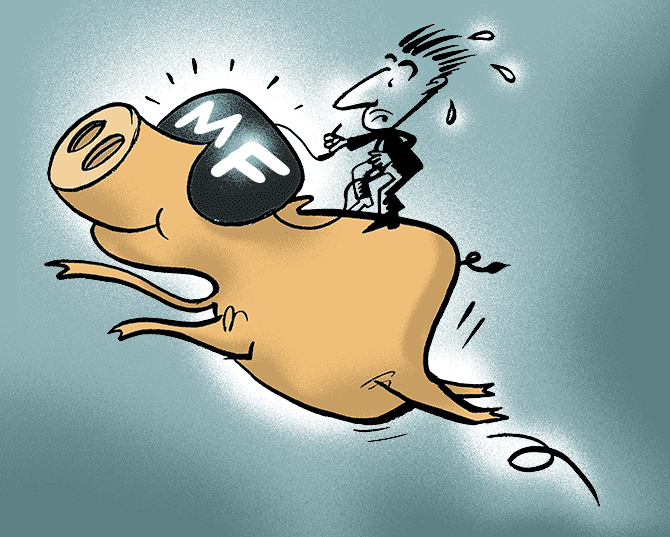The main benefit of passive funds for investors is that they are low cost, which results in more of the investor's money working for him, suggests Sanjay Kumar Singh.
Illustration: Dominic Xavier/Rediff.com

Indian investors have traditionally favoured actively managed funds.
But data indicates that fund managers, especially those managing large-cap funds, are finding it increasingly difficult to beat their benchmarks.
Hence, it is time for investors to make some room for passive funds in their portfolios.
The Indian investors' preference for active funds is due to the fact that many have generated wealth for investors.
Currently, after Sebi's reclassification exercise, there are 135 unique diversified-equity funds.
Eighty-eight of them have at least a 10-year history.
Of them, 32 have given returns of above 15 per cent since inception, the highest going up to 24.4 per cent.
"India is a fast-growing economy with nominal GDP in the 10-11 per cent range. It has a diversified mix of sectors such as pharma, auto, technology (software), oil and gas, banking and NBFCs that offer a lot of opportunities to fund managers. Also, we have seen listings from other sectors like insurance recently," says Chintan Haria, head-product development and strategy, ICICI Prudential Asset Management Company.
In recent years, however, evidence is beginning to emerge that active fund managers are finding it difficult to beat their benchmarks, especially within the large-cap segment of the market (see table below), where fund managers invest in the top 100 stocks by market cap, a very well-tracked part of the market.
Fund managers say this has happened because only a handful of stocks within the Nifty -- barely 5-10 -- have performed over the past couple of years.
It is difficult for active fund managers, who have more diversified portfolios, to outperform when so few stocks are doing well.
Haria is confident that active fund managers will make a comeback soon.
"At present there is extremely high interest in select quality stocks, where investors are paying more for even a small hint of earnings growth, leading to exceptional valuation of some FMCG and consumer-oriented stocks. By staying rational, avoiding the over-valued segment, and betting on stocks whose valuations are attractive, fund managers shall be able to generate alpha over the next three-five years," he says.
However, there is other evidence to show that a significant number of active funds tend to underperform their benchmarks even over the long term.
The latest S&P Indices Versus Active Funds (SPIVA) report (for end 2018) had shown that 64.23 per cent of large-cap funds were outperformed by their indices (or 35.77 per cent outperformed) over the 10-year period.
In the mid and small-cap category, 55.26 per cent funds were outperformed by their indices (or 44.74 per cent of funds outperformed).
What should you do? Begin by making an allocation to passive funds in the large-cap segment.
"About 50 per cent of your large-cap exposure should be to passive funds," says Vishal Dhawan, chief financial planner, Plan Ahead Wealth Advisors.
Within the mid and the small-cap categories, active fund managers have greater scope to outperform as this is a less well-tracked territory.
Try to get expert advice when selecting active funds.
"When buying passive funds, go with those having low expense ratio and low tracking error," says Dhawan.
Those just entering the markets should stick to passive funds.
"Millions of digital, do-it-yourself investors, who don't have an advisor, enter the market every year. There are others who have only invested in fixed-income in the past. Instead of trying to select the best fund managers, they should simply buy the market by opting for a Nifty 500 kind of index fund," says Aashish P Somaiyaa, managing director and CEO, Motilal Oswal AMC.
Finally, keep a close eye on smart-beta index based passive funds.
Instead of being based on market cap, these indices are built using fundamental criteria, like price to earnings, return on equity, return on capital employed, low volatility, etc (they could be based on one factor or several).
Track their performance as these could be game changers in the passive space.
Kalpen Parekh, President, DSP Investment Managers
In August 2018, if you looked at the weighted average performance of all the asset under management (AUM) of large-cap funds and compared it to the BSE 100 Total Return Index, the alpha was -5 percentage points.
That was the time when the top seven stocks had captured most of the returns.
Fund managers could not possibly be fully invested in only those seven stocks.
At present, the one-year alpha is -0.3 percentage points.
Thus, a large part of the underperformance has got neutralised.
If a fund manager has a framework for the kind of stocks he believes will generate alpha and sticks to it, he will be able to beat the benchmark over a 5-7-year horizon.
Sundeep Sikka, ED & CEO, Reliance Nippon Life Asset Management
The main benefit of passive funds for investors is that they are low cost, which results in more of the investor's money working for him.
Passive investing also eliminates the risks of stock and fund manager selection.
Passive funds can be used with active funds using a core-satellite mix.
In the core part of the portfolio, which should generally be left untouched, investors should focus on low cost and broad diversification, instead of taking unnecessary risks to generate outperformance.
Passive funds are an ideal fit for this.
In the satellite portion, they can consider strategies they think will generate alpha.
Here they can put some money in products that they feel can outperform.
| Large-cap funds are having most difficulty in beating the benchmark | |||
| Percentage of funds that have outperformed benchmark | |||
| Fund category | 1-year | 3-year | 5-year |
| Large-cap | 26.7 | 6.9 | 51.7 |
| Multi-cap | 46.7 | 37.0 | 60.0 |
| Mid-cap100 | 52.4 | 66.7 | . |
| Small-cap | 93.3 | 71.4 | 92.9 |
| Source: mutualfundindia.com | |||











